人教版八年级下册英语第四单元笔记
- 格式:doc
- 大小:28.50 KB
- 文档页数:7

英语八年级下册人教版第4单元笔记一、单元主题概述。
嘿呀,八年级下册人教版英语第4单元那可是相当有趣的哟!这个单元主要围绕着一些社会问题和慈善活动来展开哒。
通过各种对话、短文啥的,让咱了解到很多关于帮助他人、为社会做贡献的事儿呢。
二、重点词汇梳理。
1. allow.- 读音:英 [əˈlaʊ] 美 [əˈlaʊ]。
- 解释:允许,准许。
比如说:My parents don't allow me to stay out late.(我父母不允许我在外待到很晚。
)。
- 近义词:permit。
- 反义词:forbid。
2. wrong.- 读音:英 [rɒŋ] 美 [rɔːŋ]。
- 解释:错误的,不对的。
例如:It's wrong to lie.(说谎是不对的。
)。
- 近义词:incorrect。
- 反义词:right。
3. guess.- 读音:英 [ɡes] 美 [ɡes]。
- 解释:猜测,推测。
像这样用:I guess he is at home.(我猜他在家。
)。
- 近义词:suppose。
三、重点短语归纳。
1. get an education 接受教育。
这个短语在谈论关于学习、上学相关的话题时经常会用到哦。
比如说:Everyone should get an education.(每个人都应该接受教育。
)。
2. clean up 打扫,清理。
一般用于描述打扫某个地方。
例如:Let's clean up the classroom.(咱们打扫一下教室吧。
)。
3. give out 分发,发放。
常见于描述分发物品的情景。
像:We need to give out the leaflets.(我们需要分发这些传单。
)。
四、重点句型剖析。
1. I don't think sixteen-year-olds should be allowed to drive.这个句子用了宾语从句的否定转移哦。
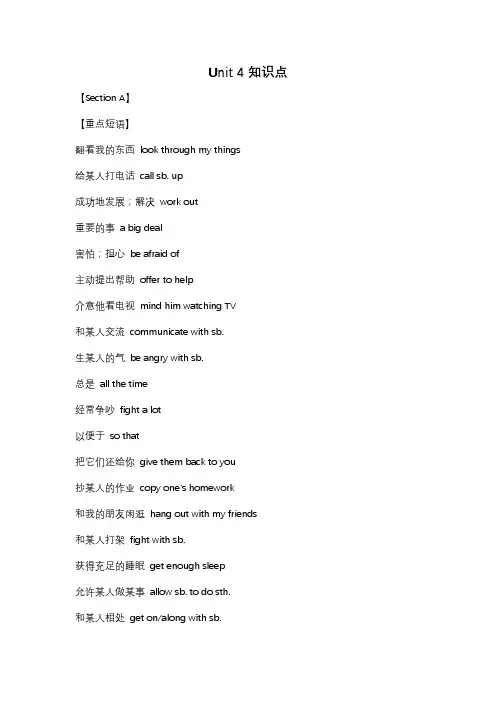
Unit 4知识点【Section A】【重点短语】翻看我的东西 look through my things给某人打电话 call sb. up成功地发展;解决 work out重要的事 a big deal害怕;担心 be afraid of主动提出帮助 offer to help介意他看电视 mind him watching TV和某人交流 communicate with sb.生某人的气 be angry with sb.总是 all the time经常争吵 fight a lot以便于 so that把它们还给你 give them back to you抄某人的作业 copy one's homework和我的朋友闲逛 hang out with my friends和某人打架 fight with sb.获得充足的睡眠 get enough sleep允许某人做某事 allow sb. to do sth.和某人相处 get on/along with sb.拒绝做某事 refuse to do sth.【重点句型】我的父母不允许我和我的朋友们闲逛。
My parents don't allow me to hang out with my friends.昨天,我发现我的妹妹正在浏览我的东西。
I found my sister looking through my things yesterday.尽管她做得不对,但也没什么了不起的。
Although she's wrong, it's not a big deal.你为什么不坐下来和你的哥哥交流呢?Why don't you sit down and communicate with your brother?【重点单词】offer v. 主动提出;自愿给予allow v. 允许;准许wrong adj. 有毛病return v. 归还;返回nervous adj. 紧张的clear adj. 清楚易懂的;晴朗的relation n. 关系;联系explain v. 解释;说明instead adv. 代替;反而whatever pron. 任何;每一deal n. 协议;交易proper adj. 正确的;恰当的anymore adv. 再也(不);(不)再【词形变换】guess v. 猜测;估计 → guesses (三单)copy v. 抄袭;复制;复印 → copies (三单) → copying (现在分词) → copied (过去式)communicate v. 交流;沟通 → communication (n.)argue v. 争吵;争论 → arguing (现在分词) → argued (过去式)【Section B】【重点短语】把他们和其他孩子做比较 compare them with other children在我看来 in my opinion存更多钱 save more money删去;删掉;停止 cut out把他们的孩子逼得很紧 push their kids so hard寻找异同 look for differences and similarities进入一所好大学 get into a good university吃垃圾食品 eat junk food调低电视声音 turn down the TV造成太多的压力 cause a lot of stress足够的业余时间 enough free time彼此;互相 each other足够的业余时间 enough free time给我很大的学业上的压力 give me a lot of pressure about school和某人打架/争吵 have a fight with sb.与我的同学竞争 compete with my classmates业余活动 free time activities从很小的时候开始 from a young age【重点句型】可是,疲惫的孩子们直到晚上7点后才到家。
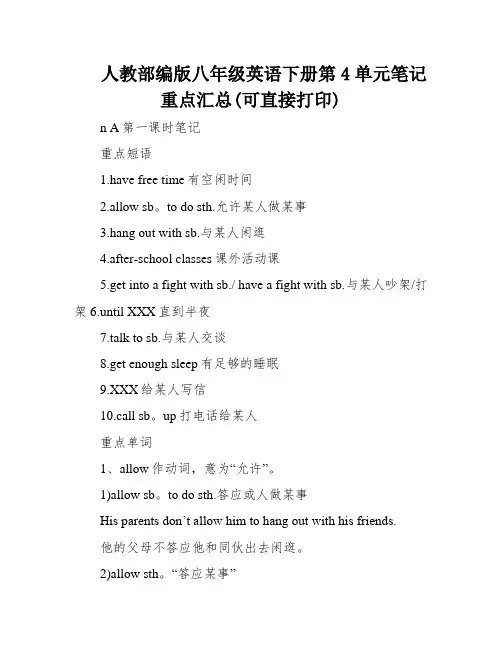
人教部编版八年级英语下册第4单元笔记重点汇总(可直接打印)n A第一课时笔记重点短语1.have free time有空闲时间2.allow sb。
to do sth.允许某人做某事3.hang out with sb.与某人闲逛4.after-school classes课外活动课5.get into a fight with sb./ have a fight with sb.与某人吵架/打架6.until XXX直到半夜7.talk to sb.与某人交谈8.get enough sleep有足够的睡眠9.XXX给某人写信10.call sb。
up打电话给某人重点单词1、allow作动词,意为“允许”。
1)allow sb。
to do sth.答应或人做某事His parents don’t allow him to hang out with his friends.他的父母不答应他和同伙出去闲逛。
2)allow sth。
“答应某事”I don't think she will allow it.我想她不会允许这件事情。
3)allow XXX.“允许做某事”XXX.在我们家不允许抽烟。
4)XXX.“被答应做某事”Passengers are not allowed to smoke on the bus.在公交车上,乘客不允许抽烟。
2、XXX.发觉或人在做某事其中的doing(现在分词)作宾语补足语。
类似的还有: XXX。
意为“看到/窥察到XXX听到XXX留意到XXX觉得或人在做某事”。
3、词语辨析:太多:too much+不可数名词例:too much homework太多功课太多:too many +可数名词复数例:too many people太多人太:much too+副词或形容词例:much too salty太咸重点句型1、What’s wrong with。
意为“……怎样了?”相当于What’s the matter with。
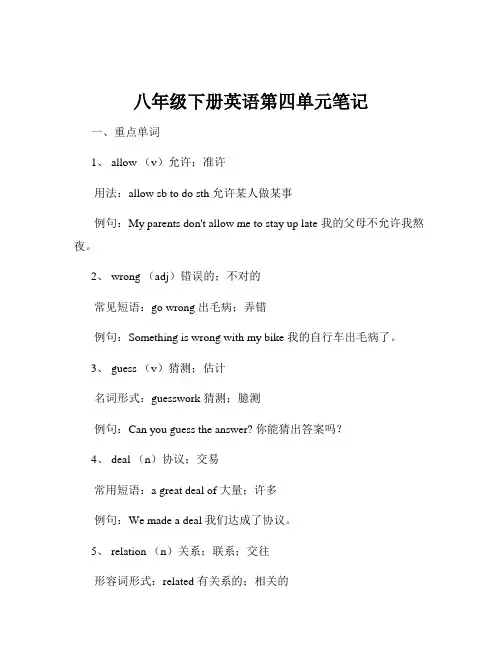
八年级下册英语第四单元笔记一、重点单词1、 allow (v)允许;准许用法:allow sb to do sth 允许某人做某事例句:My parents don't allow me to stay up late 我的父母不允许我熬夜。
2、 wrong (adj)错误的;不对的常见短语:go wrong 出毛病;弄错例句:Something is wrong with my bike 我的自行车出毛病了。
3、 guess (v)猜测;估计名词形式:guesswork 猜测;臆测例句:Can you guess the answer? 你能猜出答案吗?4、 deal (n)协议;交易常用短语:a great deal of 大量;许多例句:We made a deal 我们达成了协议。
5、 relation (n)关系;联系;交往形容词形式:related 有关系的;相关的例句:The relation between them is very good 他们之间的关系很好。
6、 communication (n)交流;沟通动词形式:communicate 交流;沟通例句:Good communication is important in a family 在一个家庭中,良好的沟通很重要。
7、 argue (v)争吵;争论名词形式:argument 争吵;争论例句:They often argue about small things 他们经常为小事争吵。
8、 cloud (n)云;云朵形容词形式:cloudy 多云的例句:There are many clouds in the sky 天空中有很多云。
9、 elder (adj)年纪较长的辨析:elder 通常用于表示家庭成员之间的长幼关系;older 则用于比较年龄大小。
例句:My elder brother is two years older than me 我哥哥比我大两岁。
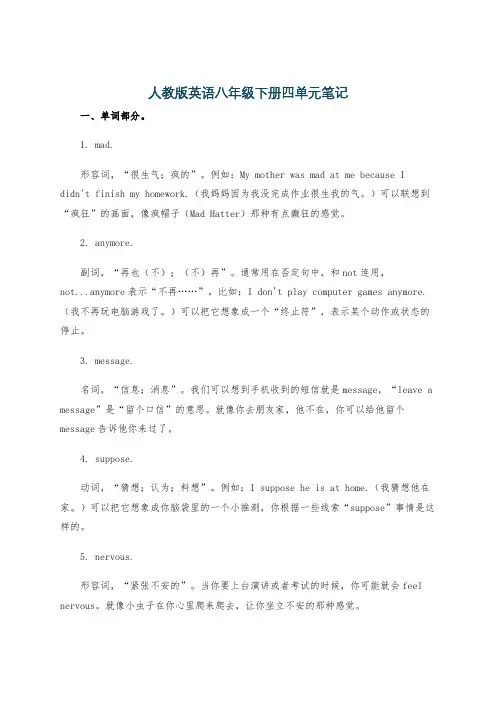
人教版英语八年级下册四单元笔记一、单词部分。
1. mad.形容词,“很生气;疯的”。
例如:My mother was mad at me because Ididn't finish my homework.(我妈妈因为我没完成作业很生我的气。
)可以联想到“疯狂”的画面,像疯帽子(Mad Hatter)那种有点癫狂的感觉。
2. anymore.副词,“再也(不);(不)再”。
通常用在否定句中,和not连用,not...anymore表示“不再……”。
比如:I don't play computer games anymore.(我不再玩电脑游戏了。
)可以把它想象成一个“终止符”,表示某个动作或状态的停止。
3. message.名词,“信息;消息”。
我们可以想到手机收到的短信就是message,“leave a message”是“留个口信”的意思。
就像你去朋友家,他不在,你可以给他留个message告诉他你来过了。
4. suppose.动词,“猜想;认为;料想”。
例如:I suppose he is at home.(我猜想他在家。
)可以把它想象成你脑袋里的一个小推测,你根据一些线索“suppose”事情是这样的。
5. nervous.形容词,“紧张不安的”。
当你要上台演讲或者考试的时候,你可能就会feel nervous。
就像小虫子在你心里爬来爬去,让你坐立不安的那种感觉。
二、短语部分。
1. look through.含义是“浏览;快速查看”。
就好像你快速地翻看书本或者报纸,眼睛像扫描仪一样“look through”,比如:I often look through magazines in the library.(我经常在图书馆浏览杂志。
)2. big deal.口语中表示“重要的事或状况;大事”。
不过有时候也带有一种讽刺的意味,比如说:It's not a big deal.(没什么大不了的。
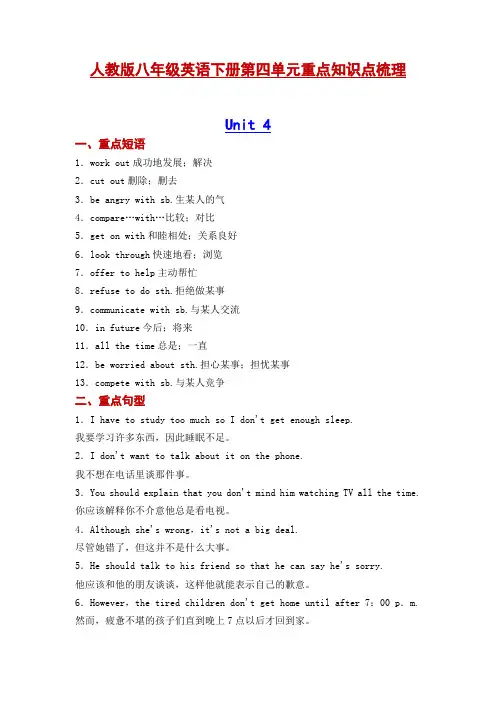
人教版八年级英语下册第四单元重点知识点梳理Unit 4一、重点短语1.work out成功地发展;解决2.cut out删除;删去3.be angry with sb.生某人的气4.compare…with…比较;对比5.get on with和睦相处;关系良好6.look through快速地看;浏览7.offer to help主动帮忙8.refuse to do sth.拒绝做某事9.communicate with sb.与某人交流10.in future今后;将来11.all the time总是;一直12.be worried about sth.担心某事;担忧某事13.compete with sb.与某人竞争二、重点句型1.I have to study too much so I don't get enough sleep.我要学习许多东西,因此睡眠不足。
2.I don't want to talk about it on the phone.我不想在电话里谈那件事。
3.You should explain that you don't mind him watching TV all the time. 你应该解释你不介意他总是看电视。
4.Although she's wrong,it's not a big deal.尽管她错了,但这并不是什么大事。
5.He should talk to his friend so that he can say he's sorry.他应该和他的朋友谈谈,这样他就能表示自己的歉意。
6.However,the tired children don't get home until after 7:00 p.m. 然而,疲惫不堪的孩子们直到晚上7点以后才回到家。
三、重点语法状语从句(一)一、until的用法until意为“直到”,引导时间状语从句。
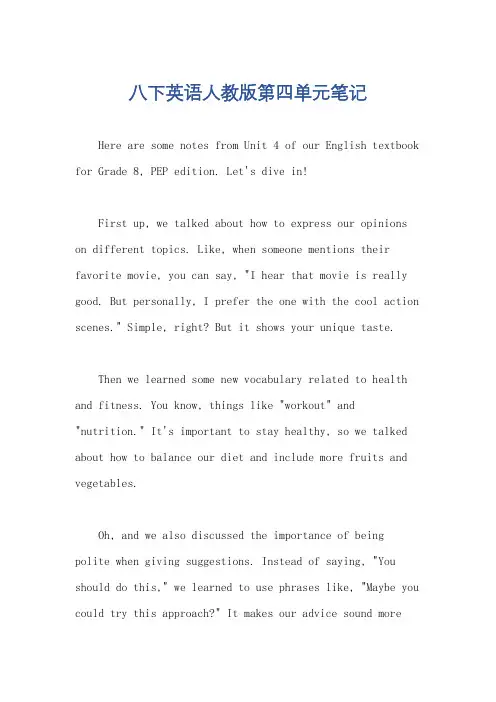
八下英语人教版第四单元笔记Here are some notes from Unit 4 of our English textbook for Grade 8, PEP edition. Let's dive in!First up, we talked about how to express our opinions on different topics. Like, when someone mentions their favorite movie, you can say, "I hear that movie is really good. But personally, I prefer the one with the cool action scenes." Simple, right? But it shows your unique taste.Then we learned some new vocabulary related to health and fitness. You know, things like "workout" and "nutrition." It's important to stay healthy, so we talked about how to balance our diet and include more fruits and vegetables.Oh, and we also discussed the importance of beingpolite when giving suggestions. Instead of saying, "You should do this," we learned to use phrases like, "Maybe you could try this approach?" It makes our advice sound moreconsiderate.And let's not forget about the fun part role-playing! We practiced having conversations about different scenarios, like asking for directions or making plans with friends. It was a great way to practice our speaking skills.Lastly, we touched on the topic of dealing with stress. We learned that everyone feels stressed sometimes, but it's important to find healthy ways to cope with it. Like, doing something you enjoy or talking to a friend.So that's a quick overview of what we covered in Unit 4. Hopefully, these notes will help you remember the keypoints!。
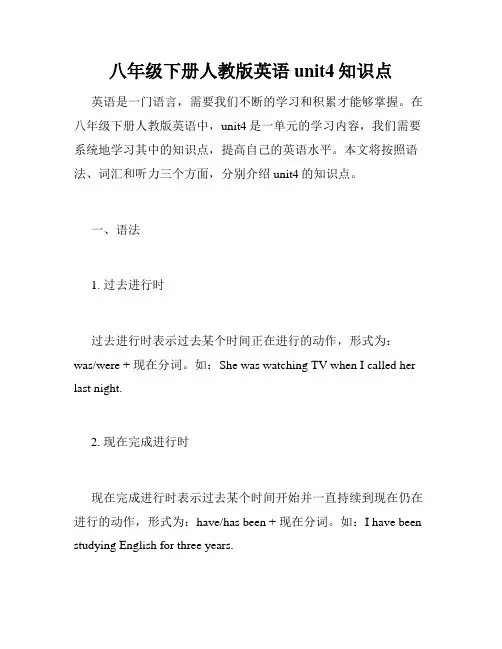
八年级下册人教版英语unit4知识点英语是一门语言,需要我们不断的学习和积累才能够掌握。
在八年级下册人教版英语中,unit4是一单元的学习内容,我们需要系统地学习其中的知识点,提高自己的英语水平。
本文将按照语法、词汇和听力三个方面,分别介绍unit4的知识点。
一、语法1. 过去进行时过去进行时表示过去某个时间正在进行的动作,形式为:was/were + 现在分词。
如:She was watching TV when I called her last night.2. 现在完成进行时现在完成进行时表示过去某个时间开始并一直持续到现在仍在进行的动作,形式为:have/has been + 现在分词。
如:I have been studying English for three years.3. 疑问句中的主语倒装疑问句中如果主语是名词或代词,要使用主语倒装的形式。
如:What does he want? → What does he want?Where is your book? → Where is your book?二、词汇1. 计划plan,表示计划,如:My plan for the summer holiday is to go to the beach.2. 表明indicate,表示表明,如:The report indicates that the economy is improving.3. 丰富abundant,表示丰富,如:Our school has abundant resources for learning.4. 威胁threaten,表示威胁,如:The storm threatens to damage our house.5. 焦虑anxious,表示焦虑,如:She is anxious about her exam tomorrow.三、听力1. 听力技巧在听力考试中,我们需要注意以下几个技巧:先听题目,抓住重点关键词;边听边做笔记,便于加深记忆;听完后确认答案,避免失分。
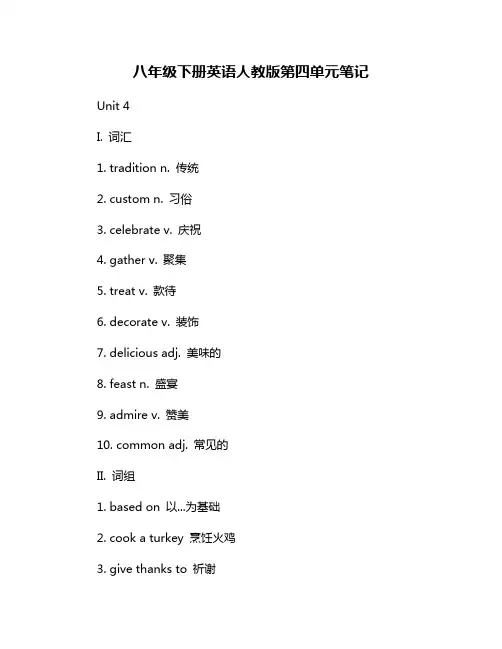
八年级下册英语人教版第四单元笔记Unit 4I. 词汇1. tradition n. 传统2. custom n. 习俗3. celebrate v. 庆祝4. gather v. 聚集5. treat v. 款待6. decorate v. 装饰7. delicious adj. 美味的8. feast n. 盛宴9. admire v. 赞美10. common adj. 常见的II. 词组1. based on 以...为基础2. cook a turkey 烹饪火鸡3. give thanks to 祈谢4. fall down 跌倒5. in memory of 纪念6. make a wish 许愿III. 语法1. 被动语态:主动语态和被动语态的构成及应用。
2. 情态动词should:表示建议、规定、习俯等用法。
3. if引导的条件状语从句:if引导的条件状语从句的用法。
IV. 作文1. My Favorite FestivalWrite an article about your favorite festival, introducing its customs, traditions, and what you like the most about it.V. 阅读理解Every culture has its own set of unique traditions and customs. Here are a few customs from around the world:1. In Japan, people celebrate Hanami, which is a festival to admire cherry blossoms in the spring.2. In Mexico, Day of the Dead is a holiday where families gather to remember and honor deceased loved ones.3. In India, Diwali is a festival of lights where people decorate their homes with candles and lamps.4. In the United States, Thanksgiving is a holiday where families come together to feast and give thanks for the blessings of the past year.VI. 交际用语1. How was your weekend?2. What did you do for Christmas?3. Did you have a good time at the party?4. How do you celebrate New Year's Eve?5. Have you ever tried traditional Chinese food?VII. 课外阅读Read a short story or article about a cultural festival from another country, and write a summary of what you learned.VIII. 练习Complete the sentences with the correct form of the verbs in brackets:1. They __________ (decorate) the Christmas tree last night.2. The turkey __________ (cook) by Sarah for Thanksgiving dinner.3. Diwali __________ (celebrate) in India with fireworks and lights.4. Day of the Dead __________ (remember) loved ones who have passed away.IX. 国际交流Share with a partner about a traditional festival from your culture and ask them about a festival from their culture. Discuss the customs, traditions, and similarities/differences between the two festivals.X. 课堂表现Participate actively in class discussions, ask questions, and share your thoughts on different cultural festivals. Take notes on new vocabulary and grammar structures learned in this unit.以上为八年级下册英语人教版第四单元的笔记内容,希會能对您有所帮助。
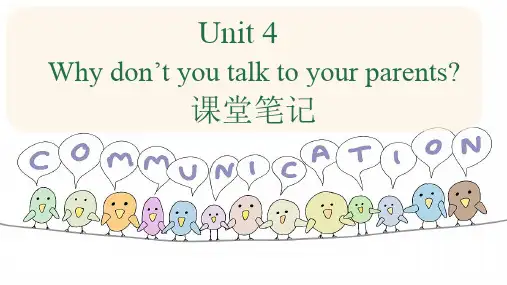
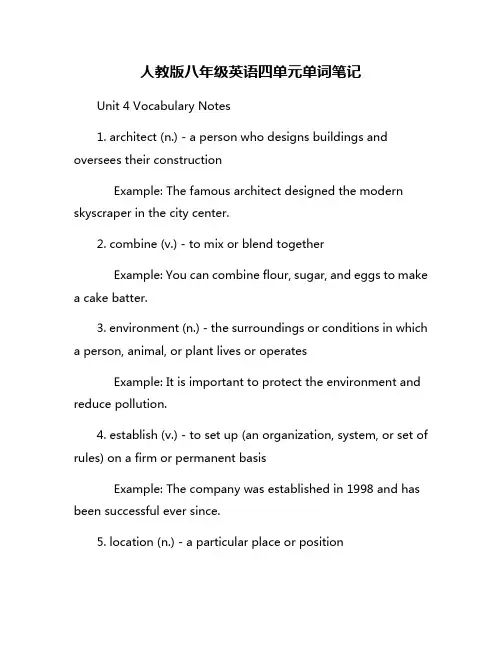
人教版八年级英语四单元单词笔记Unit 4 Vocabulary Notes1. architect (n.) - a person who designs buildings and oversees their constructionExample: The famous architect designed the modern skyscraper in the city center.2. combine (v.) - to mix or blend togetherExample: You can combine flour, sugar, and eggs to make a cake batter.3. environment (n.) - the surroundings or conditions in whicha person, animal, or plant lives or operatesExample: It is important to protect the environment and reduce pollution.4. establish (v.) - to set up (an organization, system, or set of rules) on a firm or permanent basisExample: The company was established in 1998 and has been successful ever since.5. location (n.) - a particular place or positionExample: The new restaurant has a great location in the heart of the city.6. modern (adj.) - relating to the present or recent times as opposed to the remote pastExample: The school has modern facilities including computers and interactive whiteboards.7. structure (n.) - the arrangement of and relations between the parts or elements of something complexExample: The old bridge had a strong structure that allowed cars to pass safely.8. design (n.) - a plan or drawing produced to show the look and function or workings of a building, garment, or other object before it is madeExample: The fashion designer created a beautiful design for the new collection.9. function (n.) - an activity that is natural to or the purpose of a person or thingExample: The main function of a computer is to process data and information.10. layer (n.) - a sheet, quantity, or thickness of material, typically one of several, covering a surface or bodyExample: The cake was made up of multiple layers of sponge and cream.11. origin (n.) - the point or place where something begins, arises, or is derivedExample: The origin of the tradition dates back to ancient times.12. style (n.) - a distinctive appearance, typically determined by the principles according to which something is designedExample: The artist has a unique style that is instantly recognizable.13. surroundings (n.) - the things and conditions around a person or thingExample: The hotel offers beautiful surroundings with views of the mountains and the sea.14. adapt (v.) - make (something) suitable for a new use or purpose; modifyExample: The company had to adapt its products for the international market.15. block (n.) - a large solid piece of hard material, especially rock, stone, or woodExample: The city was built using large blocks of marble for the buildings.These vocabulary notes will help you understand and use the words in Unit 4 effectively. Practice with these words to improve your English skills!。
Section A 第一课时笔记重点短语1.have free time有空闲时间2.allow sb. to do sth. 允许某人做某事3.hang out with sb. 与某人闲逛4. after-school classes课外活动课5. get into a fight with sb./ have a fight with sb. 与某人吵架/打架6. until midnight直到半夜7. talk to sb. 与某人交谈8. get enough sleep有足够的睡眠9. write sb. a letter给某人写信10. call sb. up打电话给某人重点单词1、allow作动词,意为“允许”。
(1)allow sb. to do sth. 允许某人做某事His parents don’t allow him to hang out with his friends.他的父母不允许他和朋友出去闲逛。
(2) allow sth. “允许某事”I don't think she will allow it. 我想她不会允许这件事情。
(3) allow doing sth.“允许做某事”We don't allow smoking in our house.在我们家不允许抽烟。
(4) be allowed to do sth.“被允许做某事”Passengers are not allowed to smoke on the bus.在公交车上,乘客不允许抽烟。
2、find sb. doing sth. 发现某人在做某事其中的doing(现在分词)作宾语补足语。
类似的还有: see/watch/hear/notice/feel sb. doing sth. ,意为“看到/观察到/听到/注意到/感觉某人在做某事”。
3、词语辨析:太多:too much+ 不可数名词例:too much homework太多作业太多:too many + 可数名词复数例:too many people太多人太: much too+ 副词或形容词例:much too salty 太咸重点句型1、What’s wrong with. . . ? 意为“……怎么了? ”相当于What’s the matter with. . . ?2、表建议的句型:(1)你为什么不……Why don't you +V原? = Why not +V原例:Why don’t you talk to your parents.=Why not talk to your parents.(2)你应该/可以…You should/could +v.(3)你最好(不)…You’d better (not) +v.(4)你介意….. Would you mind doing…?(5)……怎么样?What about…? =How about…?(6)你认为……怎么样?What do you think of…? = How do you like…? Section A 第二课时笔记重点短语1. look through快速查看;浏览2. be angry with sb. 生某人的气3. a big deal重要的事4. work out成功地发展;解决5. get on with = get along with和睦相处,关系良好6. fight a lot经常吵架/打架7. hang over笼罩8. refuse to do sth. 拒绝做某事9. offer to do sth. 主动提出做某事10. be nice to sb.”对某人友好”相当于be friendly/good/kind to sb.11. mind sb. doing sth. 介意某人做某事12. in future今后13. make sb. angry使某人生气14. worry about sth. 担心某事重点单词1.(1)fight做名词:get into a fight with sb.=have a fight with sb. 与某人吵架/打架(2)做fight 动词:fight with sb. 与某人吵架/打架2. argueargue作动词,意为“争论,争吵”。
8年级下册英语人教版第4单元笔记全文共6篇示例,供读者参考篇1Unit 4 Class Notes - EnglishHey guys! Today we're gonna talk about the fourth unit in our English textbook. It's all about different cultures and customs in different countries. It's super interesting and we're gonna learn a lot of cool stuff, so let's get started!First off, we learned about greeting customs in different countries. Did you know that in Japan, people bow to each other as a way of saying hello? And in France, they kiss on the cheeks three times! It's so cool how every country has its own unique way of greeting people.Next, we talked about holidays and celebrations. We learned about Chinese New Year and how people celebrate with dragon dances and fireworks. It sounds like so much fun! We also learned about Thanksgiving in America and how people gather with their families to eat a big feast. Yum!Then, we studied different types of food from around the world. We learned about sushi from Japan, pasta from Italy, and curry from India. I'm getting hungry just thinking about it! It's amazing how food can bring people together and help us learn about different cultures.Lastly, we learned about traditional clothing in different countries. We talked about kimonos from Japan, saris from India, and hanboks from Korea. It's so cool to see all the colorful and beautiful outfits that people wear in different parts of the world.Overall, this unit was so fun and interesting. I loved learning about different cultures and customs, and I can't wait to travel the world and experience them for myself one day. Thanks for reading my class notes, see you next time!篇2Unit 4 My English TeacherHey everyone! Today, I want to share with you all about our English teacher in the 8th grade. Her name is Miss Lily, and she is the best English teacher ever!First of all, Miss Lily is super nice and friendly. She always greets us with a big smile and asks us how we are doing. Shemakes learning English fun by playing games, singing songs, and even watching English movies together. We never get bored in her class!Secondly, Miss Lily is a great teacher because she is very patient with us. Whenever we have trouble understanding something, she explains it to us in a clear and simple way. She never gets mad at us for making mistakes and always encourages us to keep trying our best.Moreover, Miss Lily is really good at teaching us new words and grammar rules. She uses a lot of visual aids and examples to help us understand. She also gives us plenty of exercises and homework to practice what we have learned in class.In addition, Miss Lily is very supportive of us. She always praises us when we do well and helps us when we are struggling. She is like a friend to us, someone we can trust and rely on.In conclusion, I am so grateful to have Miss Lily as my English teacher. She makes learning English exciting and enjoyable. I hope all of you have a teacher like her too!That's all for today's English class notes. See you next time!篇3Unit 4 My DayHey guys! Today I want to share with you my notes from Unit 4 of our 8th grade English textbook. This unit is all about talking about our daily routines. Let's get started!In the morning, I usually wake up at 6:30 a.m. Then, I brush my teeth and wash my face. After that, I have breakfast with my family. I love eating cereal and drinking orange juice!At 7:30 a.m., I leave for school. I walk to the bus stop and take the school bus with my friends. We chat and laugh all the way to school.In the classroom, we have different subjects like math, English, science, and history. My favorite subject is English because I love reading and writing stories.During lunchtime, my friends and I eat together in the cafeteria. We talk about our favorite TV shows and play games on our phones.After school, I usually have soccer practice. I love playing sports and hanging out with my teammates. It's so much fun!When I get home, I do my homework and study for exams. Sometimes, I watch TV or play video games with my siblings before dinner.At night, I take a shower, read a book, and go to bed around 9:00 p.m. I like to listen to music before falling asleep.That's a typical day in my life. I hope you enjoyed reading my notes from Unit 4! Let's keep learning and improving together. See you next time!篇4Unit 4 My homeHi everyone! Today I'm gonna talk about the 8th grade unit 4 English notes. This unit is all about different types of houses and homes, so let's get started!First, we learned about the different types of houses like apartments, villas, and cottages. Apartments are tall buildings with lots of homes inside. Villas are big houses with gardens and swimming pools. Cottages are small houses in the countryside. It's really cool to know about all these different types of houses!Next, we learned about the rooms in a house. There are lots of rooms like the living room, bedroom, kitchen, bathroom, and so on. Each room has different furniture and things in it. For example, the living room has a sofa and TV, the bedroom has abed and wardrobe, and the kitchen has a stove and fridge. It's fun to imagine what our dream house would look like!We also talked about furniture and appliances in the house. We learned the names of different furniture like table, chair, and bookshelf. We also learned about appliances like washing machine, microwave, and dishwasher. It's interesting to know how these things make our lives easier at home.In this unit, we also learned about giving directions to a place. We practiced using prepositions like "next to", "in front of", and "between" to describe where things are located. It's important to know how to give directions so we don't get lost!Overall, this unit was really fun and we learned a lot about houses and homes. I can't wait to use everything we learned in this unit in real life. See you next time! Bye-bye!篇5Unit 4 My DayHey guys! Today I'm gonna share with you some of the notes I took from our English class. We talked about our daily routines in Unit 4, and I learned a lot of new words and phrases. So let me break it down for you!First off, we learned how to talk about different activities we do during the day. For example, in the morning, I usually wake up, brush my teeth, and have breakfast. Then I go to school and have classes until the afternoon. After school, I might play some sports or do homework. In the evening, I have dinner with my family and then relax before bed.We also learned about time words like "morning", "afternoon", and "evening", to help us talk about when we do things. It's important to know these words so we can describe our daily routines clearly.Next, we practiced using the present simple tense to talk about habits and routines. For example, I play basketball every Saturday, or I watch TV before bedtime. It's easy once you get the hang of it!We also learned about adverbs of frequency like "always", "often", "sometimes", or "never". These words help us talk about how often we do things. For example, I always brush my teeth before bed, but I never eat vegetables.Overall, I had a lot of fun learning about daily routines in Unit 4. It's cool to be able to talk about our day in English! I hope you guys found these notes helpful too. Keep practicing and see you next time!篇6Hello everyone, I'm going to share with you my notes from Unit 4 in the 8th grade English textbook. This unit is all about animals, so it's super fun and interesting!First, we learned about different kinds of animals and their habitats. For example, we talked about lions living in the savanna and polar bears in the Arctic. It was so cool to learn about where animals live and how they adapt to their environments.Next, we studied the importance of protecting endangered species. We learned about how some animals, like pandas and tigers, are in danger of becoming extinct. It's really sad to think about them disappearing forever, so we talked about ways to help save them, like donating to wildlife conservation organizations and spreading awareness.We also discussed the relationship between humans and animals. We talked about how some animals are used for work or as pets, and how we should treat them with respect and kindness. Animals are our friends, so we should always be mindful of how we interact with them.Overall, I had a lot of fun learning about animals in this unit. I hope we can all work together to protect and care for our furryand feathered friends. Let's be good stewards of the Earth and make sure all animals can live happy and healthy lives. Thanks for listening to my notes!。
Unit4 Why don’t you talk to your parents?第一课时SectionA P25-261.allow v.允许,准许→n. allowance津贴,补助→adj. allowable(法律、规章等)许可的,可承认的①allow sth.允许某事② allow doing sth允许做某事③allow sb to do sth允许某人做某事④be allowed to do th被允许于某事The low(法律)doesn't allow such an action.法律不允许这样的行为We ________ ________ ________in the room.这个房间不允许交流我父母不允许我和朋友一起去闲逛。
______________________________________________.I can't ______ _____ _____ _____ _____mom like that. 我不允许你跟妈妈那样说话We _____ _____ _____ _____ _____with each other in class 上课时我们不被允许互相交谈.这里不许吸烟。
You ______ _____ _____ _____ _____ here.2.wrong adj. 有毛病的,错误的→同义词:false错误的incorrect.错误的→反义词:right正确的correct正确的I'm sorry that your answer is wrong.很遗你的答案是错误的What's wrong怎么啦?哪儿不舒胀? What's the trouble?=What's the matter?=What happens?=What's up? 怎么啦?What's wrong? I'm really tired because I studied until midnight last night?3.look through快速查看,浏览,翻阅Yesterday I found my sister looking through my things.昨天我发现我妹妹在翻我的东西。
1八年级下册Unit 4He said I was hard-working单元笔记【单元目标】【词汇学习】1.mad adj.极为生气的;非常恼火的She was mad with me for losing my keys.她为我丢了钥匙而生我的气。
2.anymore adv.再;还(用于否定句)He doesn't come here anymore.他再也不到这儿来了。
3.however adv.无论如何He can answer the question however hard it is.不管问题有多难他都能回答。
4.suppose v.假定;认为;料想;期望What do you suppose you will do after school? 你放学后想干什么?5.nervous adj.惊慌的;神经质的I felt very nervous when I went into his office.当我走进他的办公室时,我感到很惊慌。
6.semester n.一学期;半年We will have ten subjects in this semester.这个学期我们将学十门功课。
7.disappointing adj.令人悲观的Maybe this news is disappointing .或许这是一个令人悲观的消息。
8.be supposed to 认为必需;认为应当You are supposed to be successful.你应当胜利。
9.get mad 变疯;变得着迷She gets mad about going to dance.她对跳舞着了迷。
10.get over 复原,克服困难Can we get over this difficulty? 我们能克服这个困难吗?11. first of all 首先12. pass on 传递13. be supposed to 被期望或被要求……14. do better in 在......方面做得更好15. be in good health 身体健康16. report card 成果单17. get over克服;复原;宽恕18. open up 打开;开拓;开发;开放19. care for照料;照看20.have a party for sb.为某人实行一次聚会21.be mad at sb 对某人恼火,生气【重点句型分析】1. What are some soap operas you know? 你所知道的有哪些肥皂剧?you know是定语从句,修饰前面的名词soap operas2. What are some things that happen on soap operas?肥皂剧里发生了些什么事?That happen on soap operas 是定语从句,修饰前日面的名字something.2拉娜说她不再生玛西娅的气了。
八年级下册英语人教版第四单元笔记全文共6篇示例,供读者参考篇1Title: My Notes for Unit 4 in Grade 8 English TextbookHi guys! Today I'm going to share with you my notes for Unit 4 in our Grade 8 English textbook. I hope it can help you understand the lesson better. Let's get started!1. Vocabulary:- Adventure: an exciting or dangerous experience- Environment: the surroundings or conditions in which a person, animal, or plant lives- Wildlife: animals and plants that live in the wild- Glacier: a slowly moving mass of ice2. Grammar:- Present perfect tense: We use this tense to talk about an action that started in the past and continues into the present. For example, "I have seen that movie before."3. Reading:- The reading passage is about a group of students who went on an adventure trip to explore the environment and wildlife in a national park. They saw a glacier and learned about how it affects the environment.4. Listening:- In the listening task, we listened to a conversation between two friends who were discussing the importance of protecting the environment. They talked about the impact of pollution on wildlife.5. Writing:- The writing task asked us to write a short paragraph about our own adventure experience. I wrote about a trip to the beach where I saw dolphins swimming in the ocean.6. Speaking:- During the speaking activity, we worked in pairs to discuss what we can do to protect the environment. We came up with ideas like reducing plastic use and planting trees.I hope these notes are helpful for you guys! Remember to review the vocabulary, practice the grammar, and pay attention during the reading and listening tasks. Good luck with your studies! Let's ace this unit together!篇2Hey guys! Today I'm going to share with you the notes for Unit 4 in the 8th Grade English textbook. It's all about jobs and careers, so let's dive in!1. Jobs and Careers:- Jobs are things that people do to earn money. Some common jobs include teacher, doctor, police officer, chef, and firefighter.- Careers are the paths that people choose for their lives. You can have a career as a musician, athlete, scientist, or even a writer.2. Vocabulary:- Salary: The amount of money that you are paid for your job.- Qualifications: The skills and experience that you need for a job.- Application: A form that you fill out when you want to apply for a job.- Interview: A meeting where you talk to someone about getting a job.3. Work Experience:- It's important to gain work experience to help you decide what career you want to pursue. You can volunteer, do internships, or even work part-time while you're still in school.4. Famous People and Their Jobs:- There are many famous people who have interesting jobs. For example, Elon Musk is a CEO and founder of SpaceX and Tesla, Oprah Winfrey is a media mogul, and Serena Williams is a professional tennis player.5. Future Jobs:- The world is always changing, and new jobs are being created all the time. Some future jobs may include virtual reality designer, drone operator, or even space tour guide!Remember to study hard and think about what you want to be when you grow up. Your dream job is waiting for you! Have fun learning and exploring different career options. Good luck!篇3Unit 4: Our worldHello everyone! Today, I’m gonna tell you all about the super cool stuff we learned in the eighth grade English class, Unit 4. Buckle up 'cause we're gonna learn all about our world!First off, we learned about climate change. It's when the Earth's temperature goes up and causes crazy weather patterns. Like, the polar ice caps are melting and sea levels are rising. It's a big problem and we gotta do something about it!Next, we studied different types of pollution. Air pollution is when the air we breathe is dirty from cars and factories. Water pollution is when our lakes and rivers are full of yucky stuff. And land pollution is when our beautiful land is covered in trash. We need to recycle and be more careful about how we treat our planet!Then, we talked about endangered animals. These poor creatures are at risk of disappearing forever. We learned about efforts to protect them and how important it is to keep them safe. We can help by not buying products made from endangered animals and by supporting conservation efforts.Finally, we discussed ways to be more eco-friendly in our daily lives. Like using reusable bags, turning off lights when weleave a room, and planting trees. Small actions can make a big difference in saving our planet!So there you have it, folks! Unit 4 was all about our world and how we can make it a better place. Let's work together to protect our planet and all its amazing creatures. See you next time, friends!篇4Hello everyone! Today I'm going to share with you my notes from the fourth unit of the eighth grade English textbook. Let's dive right in!First up, we learned about different ways to express future actions, like using "be going to" or "will". For example, "I am going to visit my grandmother tomorrow" or "I will call you later." It's important to know when to use each one!Next, we talked about giving advice and making suggestions. It's important to use phrases like "You should" or "Why don't you" to offer helpful advice. For example, "You should eat more fruits and vegetables" or "Why don't you study for the test?"We also learned about the importance of using comparatives and superlatives when talking about things beingbigger, smaller, faster, or slower. For example, "This book is bigger than that one" or "She is the tallest girl in our class."Another key point we covered was how to describe daily routines using present simple tense. We can say things like "I wake up at 7 o'clock every morning" or "She goes to bed early on school nights." It's important to be able to talk about our daily habits and routines.Lastly, we learned about expressing wishes and regrets using the past simple tense. We can say things like "I wish I had studied harder for the exam" or "I regret not helping my friend when she needed me." It's important to be able to talk about things we wish we could change.Overall, it was a challenging but fun unit to study. I hope these notes help you better understand the material. Keep studying hard and practicing your English every day! Good luck, everyone!篇5Hello everyone! Today I'm going to share with you my notes from the 4th unit of the 8th grade English textbook. Let's dive right in!First, we learned about different ways to express past events. We can use the simple past tense to talk about actions that happened in the past, like "I played soccer yesterday." We also learned about the past continuous tense, which is used for actions that were happening in the past at a specific time, like "I was studying when my friend called."Next, we talked about different ways to give advice and make suggestions. We can use modal verbs like "should" and "could" to give advice, such as "You should go to bed early." We can also use phrases like "How about" and "Why don't we" to make suggestions, like "How about watching a movie tonight?"Then, we studied the use of reported speech. When we report what someone else said, we need to change the pronouns and tenses accordingly. For example, if someone said "I like ice cream", we can report it as "She said she liked ice cream."Finally, we learned about different ways to express future actions. We can use the simple future tense with "will" or "going to" to talk about future plans, like "I will visit my grandparents next week." We can also use the present continuous tense with future meaning to talk about fixed future arrangements, like "I am meeting my friends on Saturday."In conclusion, this unit was all about different ways to talk about past, present, and future events in English. By using the correct tenses and expressions, we can communicate more effectively and accurately. I hope these notes helped you understand the material better. Thanks for listening!篇6Unit 4 The Magic of DNAHey guys, it's time to learn about something super cool in our English class - DNA! We are in the eighth grade now, so we need to know more about this amazing thing that makes us who we are.First of all, what is DNA? Well, DNA stands for deoxyribonucleic acid. It's like a set of instructions that tells our bodies how to grow and function. It's like a recipe book for making us! And guess what? Every living thing, from plants to animals to humans, has DNA.DNA is made up of four nucleotides: adenine (A), thymine (T), guanine (G), and cytosine (C). These nucleotides are like letters in an alphabet, and they come together in a specific order to create our unique DNA code. Isn't that amazing?One really cool thing about DNA is that it can be passed down from generation to generation. That means we get some of our DNA from our parents, and they got some of theirs from their parents, and so on. It's like a family tree in our DNA!But here's the most exciting part - DNA is responsible for so many things about us, like our eye color, hair color, height, and even things like our personality traits. That's why we can sometimes see similarities between family members - it's all because of our DNA!Scientists have been studying DNA for a long time now, and they have found so many fascinating things about it. They can even use DNA to solve crimes or trace our ancestry! It's like a superpower hidden inside us.So, let's remember to appreciate the magic of DNA and how it makes us all special and unique. Who knows what other secrets DNA holds? Let's keep learning and exploring the wonders of science together!That's all for now, guys. See you in the next lesson! Bye-bye!。
八年级下册Unit 4单元笔记【词汇学习】1.mad adj.极为愤怒的;十分恼火的She was mad with me for losing my keys.她为我丢了钥匙而生我的气。
2.anymore adv.再;还(用于否定句)He doesn't come here anymore.他再也不到这儿来了。
3.however adv.无论如何He can answer the question however hard it is.不管问题有多难他都能回答。
4.suppose v.假定;认为;料想;期望What do you suppose you will do after school? 你放学后想干什么?5.nervous adj.紧张的;神经质的I felt very nervous when I went into his office.当我走进他的办公室时,我感到很紧张。
6.semester n.一学期;半年We will have ten subjects in this semester.这个学期我们将学十门功课。
7.disappointing adj.令人失望的Maybe this news is disappointing .也许这是一个令人失望的消息。
8.be supposed to 认为必须;认为应该You are supposed to be successful.你应该成功。
9.get mad 变疯;变得着迷She gets mad about going to dance.她对跳舞着了迷。
10.get over 恢复,克服困难Can we get over this difficulty? 我们能克服这个困难吗?11. first of all 首先12. pass on 传递13. be supposed to 被期望或被要求……14. do better in 在......方面做得更好15. be in good health 身体健康16. report card 成绩单17. get over 克服;恢复;原谅18. open up 打开;开拓;开发;开放19. care for 照料;照顾20.have a party for sb. 为某人举行一次聚会21.be mad at sb 对某人恼火,愤怒【重点句型分析】1. What are some soap operas you know? 你所知道的有哪些肥皂剧?you know是定语从句,修饰前面的名词soap operas2. What are some things that happen on soap operas? 肥皂剧里发生了些什么事?That happen on soap operas 是定语从句,修饰前日面的名字something.3. Lana said she wasn’t mad at Marcia anymore. 拉娜说她不再生玛西娅的气了。
be mad at (about) sth. (doing sth.) 对某事恼火eg. Mother got mad at (with) me for watching TV for hours. (此处的got mad at = was mad at)eg. She didn’t cry anymore.她不再哭了。
4. bring some books to her house. 给她带来一些书bring sth. to 从(远处)带来,拿来(到近处)而其反义词为:take… to“从(近处)拿(走)到(远处)eg. Could you bring some water to me?Please take the chair to Jim’s room.this message to sb.将这个消息(信息)传给某人pass on sth. to sb 把某物传递给某人eg. She said she would pass the dictionary to Tom.want to know why C didn’t return it and where it is.你想知道为什么C未将它还回来并想知道它在哪里。
此句中why C didn’t return it and where it is是宾语从句作know 的宾语,请注意宾语从句的语序。
(陈述语序)7.You were supposed to meet at the bus stop this morning to return it.你应该今早上在车站去见面并把它还给人家。
eg. He is supposed to be there on time.按理他应该准时到哪里。
【课文解析】1. In English, I’m better at reading than listening.在英语方面,我的阅读比听力更好。
be better at doing (than doing)是be good at ……的比较级,意思为“更擅长……”eg. Are they better at playing football than basketball?2. I can do better in math.在数学方面我能做得更好。
better 是well的比较级do well in 在…方面做得好 eg. Does she do well in physics?3. I finished my end –of –year exams last week. 我上周结束了期末考试。
finish doing sth eg. Did he finish doing his homework before he went to bed?4. I had a really hard time with science this semester.这学期我的科学学科学得的确不好。
5. It’s not right to copy other’s homework.抄袭别人的作业是不对的。
请记住这一句型:It’s right for sb to do …6. I said I didn’t think it was a good idea for her to copy ma homework.我说我认为对她来说抄我的作业不是个好办法。
注意1:此句中的三个动词都是过去时,即时态的一致性注意 2:中英文语序(否定词的位置)的不同7. She said it was much better if she din her own work.她说如果她自己做作业就会好多了。
much +比较级,意思是“…得多”. He runs much faster than I.8. Teaching high school students in a poor mountain village in Gansu Province may not sound like fun to you. 在甘肃省一个贫困的山村里教中学学生在你听起来可能不算什么有趣的事。
此句中may+ 动词原形,表示“可能……”sound like +名词,意思为“听起来像……”9. Every year they send 100 volunteers to teach in China’s rural areas.每年他们都往中国的乡村地区派100名志愿者去教书。
send …to …派,送…到…10. Her village was 2000 meters above sea level. 她的村庄位于海拔2千米。
Above 介词. “在…上面” above sea level”海平面”11. the thin air made her feel sick 稀薄的空气使她病了make sb. do 使某人干某事(此处只能用动词原形,不能+to) love heaving volunteer teachers there. 他们喜爱让志愿者老师教他们。
love doing (to do)often isn’t money for education. 经常没有钱来受教育。
14. I can open up my stude nts’ eyes to the outside world.我能开阔学生们的视野,把他们带到外部世界。
15. give them a good start in life 给他们一个生活的新起点give sb. sth.给某人某物 =give sth to sb16. She said she likes being a good influence in the children’s lives.她说她愿意给孩子们的生活中起一个好的影响。
17. Yang Lei enjoyed her time as a volunteer very much. 杨蕾很愿意做一个志愿者。
18. care for “Mother Earth”关心“地球母亲”19. care for wild animals in danger 关心处于危险中的野生动物20. I can’t do anything about that.我对于那件事无能为力。
【词语辨析】1. hard working 与work hard前者是形容词,可作表语、定语;如:a hard-working student ; He is hard-working.后者是一个动词短语,“努力工作”hard 是副词,修饰动作work.2. forget to do 与forget doing…前者是“忘记做……”(to do 表示将来的动作). Don’t forget to call me.别忘了打电话给我。
eg. I’ll never forget seeing the musical in New York.我永远忘不了在纽约看过的那出歌舞喜剧。
【重难点分析】直接引语和间接引语直接引述别人的原话,叫做直接引语;用自己话转述别人的话,叫做间接引语。
间接引语一般构成宾语从句。
直接引语必须放在引号内,间接引语则不用引号。
直接引语改为间接引语时,除将引语部分变成宾语从句外,还必须对直接引语中的人称、时态、指示代词、时间状语、地点状语等进行改变。